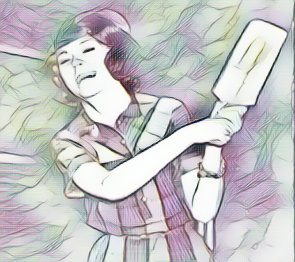(gap: 2s) My childhood unfolded in a small, close-knit town where the streets were quiet, the air always tinged with the scent of cut grass and distant woodsmoke, and the corner shop was the heart of our little world. Our family home, a modest brick house with a creaky porch swing, was filled with the laughter and squabbles of three siblings—my two brothers, my sister, and me. The rules of our household were as clear and unyielding as the ticking of the old grandfather clock in the hallway. Chores had to be done with care, curfews were set in stone, and our school grades were watched with hawk-like vigilance. Any hint of disrespect, whether a muttered word or a slammed door, was met with swift and certain consequences. Even the smallest infraction at school would echo back home, carrying with it the weight of family honor.
(short pause) My mother and father believed that every misstep was not just a personal failing, but a stain on the family’s reputation. Punishments, therefore, were never private. They were a family event, a ritual that reinforced the idea that our actions reflected on everyone. The sense of humiliation was as much a part of the punishment as the sting itself—a lesson in humility and obedience, played out before the watchful eyes of those you loved most.
(pause) When a rule was broken, the process began with a chilling formality. The offender would be quietly informed that punishment was coming. My parents never acted in anger; instead, they orchestrated the event with a calm, almost ceremonial precision. Punishment time was always set for 8pm, after the clatter of supper dishes had faded and the kitchen gleamed with the scent of soap and lemon. If someone was to be punished, the announcement would come at the dinner table, the words hanging heavy in the air, turning every bite to sawdust. The entire family was expected to gather in the living room that evening, the anticipation thick and suffocating. For me, the waiting was the worst part—the slow, relentless ticking of the clock, the glances exchanged between siblings, the knowledge that soon, all eyes would be on you.
(pause) My mother, with her gentle hands and steely resolve, was usually the one to carry out the spankings. She favoured the back of a heavy hairbrush or the flat of a wooden spoon, implements that seemed to take on a life of their own in her grasp. My father, tall and stern, reserved his belt for the most serious offences, his presence alone enough to make us tremble. The difference in their methods was stark, but the message was always the same: rules were not to be broken.
(pause) The ritual was always the same. A sturdy kitchen chair would be dragged into the centre of the living room, its wooden legs scraping across the floorboards. The chosen implement—a hairbrush, a spoon, or a belt—would be placed on the seat, gleaming ominously in the lamplight. The culprit, or sometimes more than one, would line up in front of the chair, eyes fixed on the instrument of their fate, hearts pounding in their chests. The rest of the family would settle onto the couch or armchairs, forming a silent, judgmental audience.
(pause) The waiting was a torment all its own. Fifteen minutes could stretch into an hour if more than one of us was to be punished. My aunt, who lived with us, always claimed the best seat in the room. She had a knack for making the ordeal worse, tossing out sly remarks and taunts that made our cheeks burn with shame and dread. The air would grow thick with tension, the only sounds the ticking clock and the nervous shuffling of feet.
(pause) At last, my mother or father would enter, their faces set with grim determination. My mother would sit on the kitchen chair, smoothing her skirt, and announce the reason for the punishment in a clear, unwavering voice. There was no room for argument, no hope for reprieve. She would call out our names, one by one, and we would step forward, our legs trembling, our faces flushed with fear and embarrassment.
(pause) The moment of truth was always the same. My mother would gently but firmly guide us over her knee, our faces inches from the worn rug, the world reduced to the sound of our own breathing and the looming presence of the hairbrush or spoon. The anticipation was excruciating, every second stretching out like an eternity.
(pause) Then, with a series of rapid, hard strokes, the spanking would begin. The sharp crack of the implement echoed through the room, each blow landing with a sting that seemed to set our skin on fire. We would squirm and kick, our legs flailing helplessly, as sobs burst from our lips. The pain was sharp and immediate, but it was the humiliation—knowing everyone was watching—that cut deepest.
(pause) There was never a set number of strokes. My mother’s spankings seemed to go on forever, the rhythm relentless, until we were sobbing openly and our backsides throbbed with pain. If we dared to reach back and protect ourselves, the punishment would stop—only to resume a few minutes later, harder and longer than before. We quickly learned that resistance only made things worse, and so we fought to keep our hands at our sides, no matter how much we wanted to shield ourselves.
(pause) I remember one particular evening, as clearly as if it were yesterday—a scene that could have come straight from the pages of an Enid Blyton story. The sun had just set, and the living room was bathed in the gentle glow of the lamp. I had been caught fibbing about a broken vase, and the truth had come out at supper. After the dishes were cleared away, Mother called us all together. She sat very upright on the kitchen chair, her hair neatly pinned, her expression both kind and resolute. “Laura, come here, please,” she said, her voice gentle but firm. My heart thudded as I walked across the carpet, my hands clasped tightly in front of me. Mother explained to everyone, in her clear, proper English, that telling lies was a very serious matter, and that honesty was the foundation of a good character. She told me that I would receive six smacks with the hairbrush, and that I must be brave and accept them as a lesson. With great dignity, she guided me over her knee, making sure my skirt was out of the way. I stared at the pattern in the rug, my cheeks burning with shame. Then, with a steady hand, Mother delivered six firm, even smacks to my bottom. Each one stung, but I did not cry out, determined to show I could take my punishment properly. When it was over, Mother helped me up, gave me a gentle hug, and told me she loved me. She reminded me, in front of everyone, that good children always tell the truth, and that she was sure I would remember this lesson. I stood by the fireplace for a little while, thinking about what I had done, and feeling very sorry indeed. But I also felt a curious sense of relief, as if a great weight had been lifted from my shoulders. That night, as I lay in bed, I resolved never to tell a lie again. (pause)
(pause) When it was finally over, my mother would pull us upright, her grip firm but not unkind. She would lead us by the arm to stand facing the fireplace, our faces streaked with tears, our bodies trembling. There we would remain, sometimes for an hour, the heat of the fire doing little to soothe the burning in our backsides. Additional punishments—extra chores, early bedtimes—might be handed out, but it was the silent reflection in front of the hearth that lingered longest.
(pause) Once all punishments had been delivered, we were quietly escorted to our rooms for the night. The door would close behind us with a soft click, and we were told not to come out until morning. Alone in the darkness, we would press our faces into our pillows, muffling our sobs, the pain and shame slowly giving way to exhaustion.
(pause) On average, I think I was punished about once a month until I finally left for college. Yet, I cannot recall a single week when someone in our family wasn’t called to account for their actions. The routine was as much a part of our lives as Sunday dinners or summer picnics—a constant reminder of the boundaries we were expected to respect.
(pause) Though the punishments left us with sore bottoms for days, I never felt that they were given in anger or cruelty. Looking back, I can honestly say that every punishment I received was deserved. The experience was designed to be unpleasant, and it was—but it also taught us responsibility, humility, and the importance of family. In the


























































